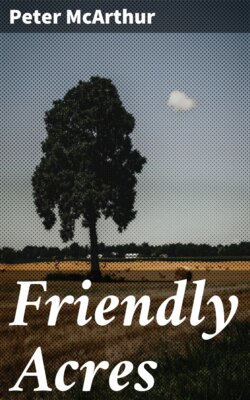Читать книгу Friendly Acres - Peter McArthur - Страница 3
На сайте Литреса книга снята с продажи.
Introduction
ОглавлениеTable of Contents
I am very glad indeed that it has been decided to publish an additional volume of Peter McArthur's Letters. It would be his wish that these, his letters, should rest at last in the hands of those for whom they were first written and it is due to his memory that his best work be rescued from the current and not be permitted to perish.
For many years McArthur maintained what was practically a continuous university extension course in the Science and Art of Complete Living. He knew deeply the conditions of life on a Canadian farm. It consisted chiefly in hard work, religion and politics—listed in that order. Except for their religious and political faiths, the soil that they tilled asserted its dominion over its owners and fixed the boundaries of their interests and their thoughts. Literature, Poetry and the Drama, History, Music and Art, the Sciences, Economics and Philosophy had housed themselves apart each in a temple of its own. Through these, week by week and year after year, by his contributions to the daily press, McArthur drove a long corridor that connected them with each other and opened on thousands of Canadian homes. It was a great task, but he had great personal resources—the reading of Johnson, the wit of Sheridan, the poetry of Ariel, the mischief of Puck, the practical sense and philosophic temper of Franklin, the patience of Penn and the faith and courage of a Crusader; and the work that he has accomplished testifies that he gave all and withheld nothing. Men have achieved immortality by compiling a single Magnum Opus—a work that deals exhaustively with a single subject and may never be seen except on the shelves of a library. It was the Magnum Opus of McArthur to place in Canadian homes a row of books which might serve as Travellers' Guides to a new philosophy of Life.
There is a relation between the permanence and prosperity of a nation and the permanence and prosperity of the national system of agriculture. It will also be found that in a country where agriculture is able to maintain itself, solve its own problems and adapt itself to new conditions, a large number of the leading men of the nation in each generation have manifested an active interest in farming. This is best illustrated perhaps in the history of Rome or in the history of England. In both of these countries and in almost all stages of their history many men who were eminent as statesmen, generals, or men of letters are found in the second line to have been practical farmers. I have in mind a well known Englishman who visited us during the war, who was a great Greek scholar, an authority in finance, and an expert gardener. In his case the scope and diversity of his interests seemed to lend additional strength to his personality and influence. Greatness of the nation as of the individual has its roots in the earth and will not long survive if these roots are permitted to wither and die. Unless Canada and the United States can grow men of the type represented by our English visitor and Peter McArthur it does not make much difference what other plans for our national safety we may decide to adopt.
Nor is it well to assume at the outset that because McArthur wrote hurriedly and at high pressure his work has little artistic value and is not likely to last. It is difficult of course to satisfy the representatives of an art. But before reaching a decision in the case of McArthur I venture to suggest this one small experiment and test. Only a few writers have attempted to depict in words the features of the seasons of the year or the months of the year. We remember chiefly Hesiod, Virgil, Varro, Tusser, Thomson and Franklin. Compare if you will McArthur's pictures of the seasons or of the months with those of Thomson. Perhaps you will decide that they are not comparable because the pictures of Thomson resemble lovely landscapes and those of McArthur are lifelike portraits, but I think you will not decide that one is superior to the other and perhaps you may decide that even as an artist McArthur has no superior in the field he has selected for himself.
I have read somewhere a description of the island of the McArthurs on the west coast of Scotland. Like rocky Ithaca its soil is "favourable for goats, unfavorable for horses." Both have sent out men of the type of farfaring, much enduring Ulysses of many counsels. From the tombs and records of the old church in the island of the McArthurs it is learned that from the time of the Crusades a McArthur has levelled a lance or lifted a battle axe in all the Scottish wars and in most of the great battles of Europe. It is an easy inference that our own Peter McArthur might have claimed kindred there and had his claim allowed. Perhaps then for the sake of the past a tablet and an inscription should go to distant Scotland, for the church of his ancestors there, but his monument will remain here where he himself has established it.
James A. MacLean.
University of Manitoba,
Winnipeg.
